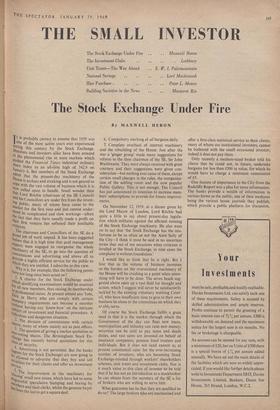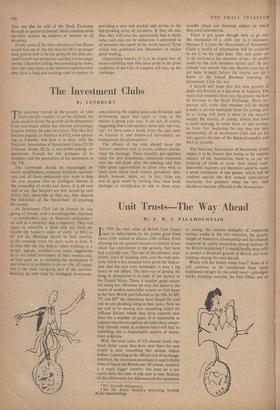THE SMALL INVESTOR
• •
The Stock Exchange Under Fire The Investment Clubs • • Unit Trusts—The Way Ahead National Savings . • Hire Purchase.. . • • • Building Societies in the News .. Maxwell Heron • . Lothbury .. E. W. I. Palamountain • .. Lord Mackintosh • Peter L. Money • Margaret Rix
The Stock Exchange Under Fire
By MAXWELL HERON
IT is probably correct to assume that 1959 was one of the most active years ever experienced during this century by the Stock Exchange. Members and investors alike have been amazed at thhee phenomenal rise in most markets which Pusd the Financial Times industrial ordinary share index to an all-time high of 342.9 on January 6. But members of the Stock Exchange House that the present-day machinery of the nouse is archaic and creaking and is not geared to cone with the vast volume of business which it is now called upon to handle. Small wonder then that Lord Ritchie (chairman of the SE Council) and his Councillors are under fire from the invest- ing public, many of whom have come to the Market for the first time and just cannot under- stand its complicated and slow workings—albeit the fact that they have usually made a profit on their first venture has softened their justifiable criticism. The chairman and Councillors of the SE do a grand job of work unpaid. It has been suggested efore that it is high time that paid management experts were engaged to reorganise the whole Machinery of the SE, to go into the question of e°111Missions and advertising and above all to Provide a highly efficient service for the public to which they are entitled. I subscribe to this view. Why is it, for example, that the following points nave not long since been acted on? l• A charter for the Stock Exchange under fwhich qualifying examinations would be essential ,°r all new members, thus raising its membership 2.Professional status. At present almost any Tom, 'Ick or Harry who can comply with certain Zionetary requirements can become a member s lhout having any 'know-how' on the intricate subject of investment and financial procedure. A r
u„iculous and dangerous situation.
The division of commissions with certain agents, many of whom mainly act as post offices. The question of giving a market quotation to eh 11-voting shares. The Birmingham Stock Ex- auge has recently barred quotations for this ass of security. (a 4- Advertising is not permitted. But the banks begeots for the Stock Exchange) are now going to se_ allowed to advertise that they buy and sell securities for their clients and offer an investment service. S'' The improvement in the machinery for Placin g, small new issues, which have led to some speculative bumping and boring by T_ been bers and their clerks, whilst the genuine buyer 'a een the last to get a square deal. 6. Compulsory marking of all bargains daily.
7. Complete overhaul of internal machinery and the rebuilding of the House. Just after the war a 'ginger group' made many suggestions for reform to the then chairman of the SE, Sir John Braithwaite. They were always received with great courtesy and their suggestions were given con- sideration—but nothing ever came of them, except certain small changes in the rules, the reorganisa- tion of the settling room and the now popular Public Gallery. This is not enough. The Council has just announced its intention to increase mem- bers' subscriptions to provide for future improve- ments.
On November 12, 1959, at a dinner given by the Lord Mayor of London, Lord Ritchie had quite a little to say about present-day legisla- tion which militates against the efficient running of the Stock Exchange machinery. He also went on to say that 'the Stock Exchange has the mis- fortune to be as often as not the Aunt Sally of the City—I think it must be said in no uncertain terms that out of ten occasions when criticism is levelled at the Stock Exchange, in nine cases the complaint is without foundation.'
I would like to think that he is right. But I fear that as the volume of business increases so the burden on the overstrained machinery of the House will be crushing to a point when some- thing will have to be done. The seven heads sug- gested above open up a vast field for thought and action, which I suggest will never be satisfactorily tackled by the existing voluntary working Coun- cil, who have insufficient time to give to their own business let alone to the committees on which they so ably serve.
Of course the Stock Exchange fulfils a great need in that it is the market through which the Government of the day can float new loans, municipalities and industry can raise new money; securities can be sold to pay taxes and death duties, and vast sums are invested on behalf of insurance companies, pension fund trustees and individuals. But it does not (and cannot as at present constituted) cater for the ever-increasing number of investors, who are becoming Stock Exchange-minded through workers' shareholders schemes, unit trusts and investment clubs. Nor is it much value to this class of investor to be told that if he has not an introduction to a stockbroker fie can obtain from the secretary of the SE a list of brokers who are willing to serve him.
What guarantee has he that they are, qualified to do so? The large brokers who are mechanised and
offer a first-class statistical service to their clients, many of whom are institutional investors, cannot be bothered with the small occasional investor; indeed it does not pay them.
Only recently a medium-sized broker told his clients that he could not, in future, undertake bargains for less than £500 in value, for which he would have to charge a minimum commission of £5.
One feature of importance to the City from the Radcliffe Report was a plea for more information. The banks provide a wealth of information in various forms to the public, one of their mediums being the various house journals they publish, which provide a public platform for discussion. This can also be said of the Stock Exchange through its quarterly journal, which contains some excellent articles on subjects of interest to all investors.
If only some of the older members of the House would face up to the fact that the SE is no longer their private club to be run primarily for their per- sonal benefit and protection and that it is no longer merely a floor for trading, but something far more, then they may come to the belated conclusion that they have a long and exciting road to explore in providing a very real market and service to the fast-growing army of investors. If they do not, then they will miss the opportunity that is theirs today and may not be tomorrow. I commend to all members the report of the Acton Society Trust which was published last December—it makes good reading.
Opportunity knocks. It is to be hoped that all serious-thinking men who have pride in the great traditions of the City of London will take up the challenge.







































 Previous page
Previous page